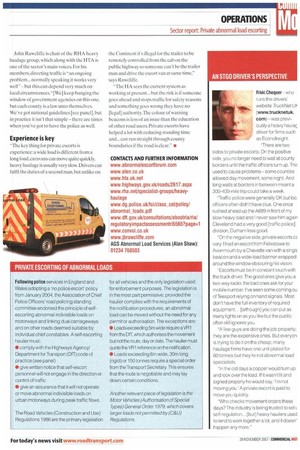PRIVATE ESCORTING OF ABNORMAL LOADS
Page 57

If you've noticed an error in this article please click here to report it so we can fix it.
Following police services in England and Wales adopting a no police escort' policy from January 2004, the Association of Chief Police Officers' road policing standing committee endorsed the principle of selfescorting abnormal indivisible loads on motorways and linking dual carriageways and on other roads deemed suitable by individual chief constables. A self-escorting haulier must: • comply with the Highways Agency/ Department for Transport (DfT) code of practice (see pane]) • give written notice that self-escort personnel will not engage in the direction or control of traffic
• give an assurance that it will not operate or move abnormal indivisible loads on urban motorways during peak traffic flows.
The Road Vehicles (Construction and Use) Regulations 1986 are the primary legislation
for all vehicles and the only legislation used for enforcement purposes. The legislation is in the most part permissive; provided the haulier complies with the requirements of the notification procedures, an abnormal load can be moved without the need for any permit or authorisation. The exceptions are:
• Loads exceeding 5m wide require a VR1 from the DfT, which authorises the movement but not the route, day or date. The haulier must quote the VR1 reference on the notif ication.
• Loads exceeding 6m wide, 30m long (rigid) or 150 tonnes require a special order from the Transport Secretary. This ensures that the route is negotiable and may lay down certain conditions.
Another relevant piece of legislation is the Motor Vehicles (Authorisation of Special Types) General Order 1979, which covers larger toads not permitted by (C&U) Regulations,






















































































































































































